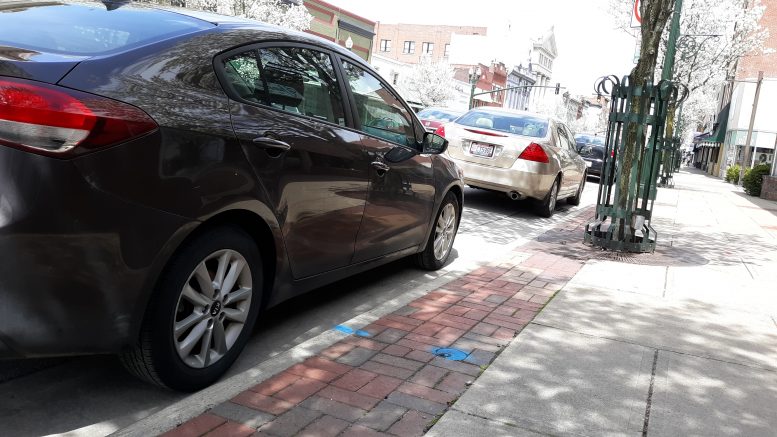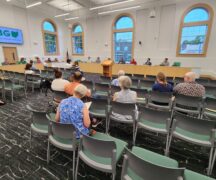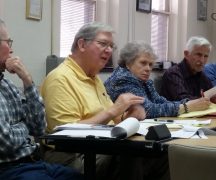By JAN LARSON McLAUGHLIN
BG Independent News
Bowling Green City Council voted 6 to 1 last week to boost its road paving budget by charging a $5 motor vehicle license tax.
Council member Greg Robinette was the lone holdout against the tax. He explained that he is “generally a skeptic” about raising taxes. While it is necessary for the city to occasionally increase taxes for vital services like police and fire – this tax is not about that.
“I don’t know that this is necessary now,” Robinette said to his fellow council members. “I recommend that we continue being a good steward of our taxes” and make do with existing road budget.
If the road budget needs more funding in the future, the city can then increase the license tax, he said.
But the other council members – President Mike Aspacher, Bill Herald, Mark Hollenbach, Bruce Jeffers, Sandy Rowland and John Zanfardino – felt the $5 increase was needed now.
“We’re not keeping up with necessary repairs on roadways,” Aspacher said.
The city’s paving funds come from state collected gas tax and vehicle license taxes. Adding to the funding difficulties is the increasing number of fuel efficient vehicles on the road that cause the revenue derived from the gas tax to decline.
The state transportation budget now allows cities to charge an additional $5 tax for vehicle licenses.
In Bowling Green, that would generate an estimated $96,000 annually dedicated to roads.
Aspacher said he is also “hesitant to approve additional fees on residents.” But based on the state’s recent record, he questioned that the ability to increase the license fees would continue to be available to the city.
The funds will go directly into the city’s street fund. And considering the condition of local roads, citizens shouldn’t fault the city for increasing the tax, Aspacher said.
Jeffers agreed.
“We’ve seen for several years our streets in general are decaying,” he said.
Jeffers pointed out that local governments pleaded with the state to help by increasing the gas tax. The gas tax was bumped up – but not as much as originally proposed, he said.
“Municipalities requested more money than the state was willing to give us,” Rowland said.
And she agreed, there is no guarantee the money will be there if the city doesn’t act now.
“I’m not certain it’s going to be there in the future,” Rowland said.
Herald said he frequently hears from constituents about the poor condition of the roads. He supported the tax because it is “targeted and not onerous.”
“I’m in favor of it because of what it will be used for,” he said.
Like many municipalities, Bowling Green has seen revenue for roads stall, while expenses continue to increase.
“Those revenue sources have been flat over the last decade,” Assistant Municipal Administrator Joe Fawcett said last week.
“It has been so many years since the city has seen an increase in funding for roads, and keeping up with the paving of surface streets has become a significant challenge,” city officials wrote in the recommendation for the ordinance.
Bowling Green currently gets 40 percent of the state’s 28-cent gas tax. That added up to $619,910 last year. A portion of this amount pays for costs associated with the overall operation of street maintenance – employee salaries, traffic signal maintenance, traffic signs, striping, vehicle maintenance and more.
The state increased the overall gas tax amount by 10.5 cents – to a total of 38.5 cents – along with the percentage allocated to local governments, from 40 to 45 percent. The net increase is estimated to bring in an additional $423,566 – all of which will be dedicated to infrastructure.
The Wood County Commissioners already acted to increase the license fee by $5 last year.
“They recognized the stagnant funding of local transportation systems and that counties were struggling to keep up with the need for bridge replacements and road repair,” Wood County Engineer Musteric said last year as the county considered the tax.
The proposed $5 increase is projected to bring in an additional $632,660 annually for road and bridge repairs. Musteric pledged to the commissioners that the additional funds would be used only on capital expenses, not on personnel or operating costs.
Currently the state registration fee is $34.50, and the local permissive fees are between $15 and $20, depending on the community.
“Our revenues have been stagnant,” Musteric said.
Meanwhile, the cost of building and maintaining roads has continued to grow. Since the last state gas tax increase, the cost of asphalt has jumped 58 percent, steel has increased 35 percent, concrete has gone up 10 percent, and road paint has jumped 38 percent, according to the county engineer’s office.





